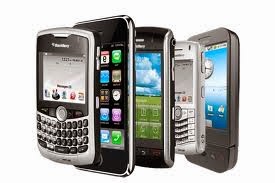This was the introduction to the lecture and it was started like this to make us think about the use of technology.
We were introduced to the poem below which was strangely first published in 1967 by Richard Brautigan.
This is apparently where the well known phrase Big Brother is watching us came from.
"All Watched Over by Machines of Loving Grace"
I like to think (and
the sooner the better!)
of a cybernetic meadow
where mammals and computers
live together in mutually
programming harmony
like pure water
touching clear sky.
I like to think
(right now please!)
of a cybernetic forest
filled with pines and electronics
where deer stroll peacefully
past computers
as if they were flowers
with spinning blossoms.
I like to think
(it has to be!)
of a cybernetic ecology
where we are free of our labours
and joined back to nature,
returned to our mammal
brothers and sisters,
and all watched over
by machines of loving grace.
We were talked through how the phones we use today have changed so rapidly and constantly. They become out of date by means of every 6months newer features being put onto phones. An example of this is that earlier phones were merely just that ,with only a few extras on such as calculator and clock etc. Many phones just had the choice of push button pads for numbers and texting, whereas now the latest phones have become touch pads which have voice activated menus, Internet connection with access to Facebook and other such sites and email facilities. Some phones have cameras which have as many pixels as any modern digital camera and recording facilities such as film and voice dictation.The list goes on to what many new phones can do G.P.S, bar code scanning etc.
The death of phone boxes to the advance in technology.
From the inconvenience of going out in the cold to chat and being unable to be contacted.
Mobile phone time line from the 80's
90's mobile phone time line
To the year 2000 mobile phone time line
I expect you can't help but see the shrinking from what we use to call THE BRICK in the 80's!
This change has come due to the advance in microchips.
Facebook
1600's to 1700's coffee houses
This is where people would come chat and share ideas face to face!
Facebook and YouTube has now replaced a lot of this kind of socialising. Do any of us even realise that once we except something so innocent as communicating with friends on this social site that Facebook can then access a lot of information about us? Do we even take the time to read the small print accompanying the agreements or do we all just eagerly press accept without reading? I know that I have.
Many people have friends that they have never even met and who now correspond regularly - this wouldn't have ever happened otherwise. Is this a modern method of having a pen pal even though the traditional letter writing appears to have also dwindled out due to the shift in how we communicate?
Logically Facebook doesn't really create anything as it's the people within the system using it that does. Is it just a matter of time before we see the post delivery service a distance memory due to emailing and being able to send attachments to one another? Digital cameras seem to have made a large impact on how we now are able to print and enhance our photos and send them via the Internet to whoever we want to send them to - but does that still mean that people will keep records in picture form? Some people still like to look at a photo on a wall or mantlepiece!
Facebook and YouTube has now replaced a lot of this kind of socialising. Do any of us even realise that once we except something so innocent as communicating with friends on this social site that Facebook can then access a lot of information about us? Do we even take the time to read the small print accompanying the agreements or do we all just eagerly press accept without reading? I know that I have.
Many people have friends that they have never even met and who now correspond regularly - this wouldn't have ever happened otherwise. Is this a modern method of having a pen pal even though the traditional letter writing appears to have also dwindled out due to the shift in how we communicate?
Logically Facebook doesn't really create anything as it's the people within the system using it that does. Is it just a matter of time before we see the post delivery service a distance memory due to emailing and being able to send attachments to one another? Digital cameras seem to have made a large impact on how we now are able to print and enhance our photos and send them via the Internet to whoever we want to send them to - but does that still mean that people will keep records in picture form? Some people still like to look at a photo on a wall or mantlepiece!
Kindle and iPad
A review of the kindle and what you can expect!
- Kindle's high-contrast E Ink display delivers clear, crisp text and images that you can read without eye strain.
- No battery anxiety - read for up to one month on a single charge with wireless off and a half hour of reading per day.
- Built-In Wi-Fi
- Kindle is ready to use right out of the box - no setup, no software to install, no computer required to download content.
- Read comfortably with eight different sizes and three font styles.
- Kindle Owners' Lending Library
- Over 1 million books, newspapers, and magazines, including latest best sellers, Kindle exclusives, and more.
- Borrow From Your Public Library
- Borrow Kindle books from your public library and start reading on your Kindle.
I've inserted the above information explaining a little about the Kindle because I had no knowledge of it prior to this research.
Ironically I haven't long learnt how to send an email!
website link is below
To be honest I don't know anything about an iPad so I have placed a website link below
"The best way to predict the future is to invent it." quote by Alan Kay
The advance in technology and speed is amazing and makes us question how did we manage without them?
The questions we should be asking are "At what price do we, and the environment in which we live, have to pay in exchange"?
We pay by being unaware that these devices are watching and analysing us, keeping our details on record, for many different reasons people and industries can now analyse how we choose, buy and use products. The iPad Touch can even know how far away from your face you are reading it and in what light conditions! Are we losing all of our human rights to privacy by being able to be tracked and people hacking into personal data? Identity fraud is another example.Are we making things too easy for others to also commit crimes against us? Are we becoming to reliant on these so called "advances in technology"? What would we all do if everything crashed? Think back to how we felt about the "Millennium Bug"!
We all remember the film BACK TO THE FUTURE. It seems a little scary now to see that the film got so many predictions about the future right.
If you get time please have a look on the link below to see how scarily accurate they were.
The environment - is it becoming overwhelmed by our easy replace attitude?
Living - do people then loose their jobs due to the capability of the advancement in machines?
Think about what things we have lost over a short period of time and then think what things may be like in a few more years time.
Not so long ago people were worried about the common book with the introduction of the new technology of kindle. With its easy way of reading and also storing books, may this have a drastic effect of us not being able to hold and read a paperback book?
Will this then also become a thing of the past?
Like everything - it has its pros an cons such as:
PROS
- Being able to store many books in one place without taking so much room up in your house.
- Less trees being torn down to make paper for the books,better for the environment
- easy to carry around
- Able to get out of copy books pre 1923
- Easly downloaded from the libary
- holds 1,400 books.
cons
- Not able to lend other people your books
- imposible to give away to charity or others
- Not all books are avaible- the one book you may want might not be converted
- Not able to buy them as cheaply as you can find them in charity shops
- Older generations may not be able to work them.
I think that not all pitfalls are considered enough and it sometimes seems like they are only dealt with when they become a problem.
CONTENT
This lecture was recorded so don't know what was brought in eg, slide show or props
This lecture was recorded so don't know what was brought in eg, slide show or props
INTEREST 10/10
DELIVERY 10/10
All photos were taken off various websites for research purposes only, links to some sites are supplied.








No comments:
Post a Comment